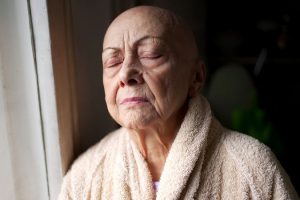Chemo May Not Offer Breast Cancer Survival Advantage After Age 80

The study covered in this summary was published on researchsquare.com as a preprint and has not yet been peer reviewed.
Key Takeaway
-
Refusing chemotherapy for high-risk ER-positive breast cancer decreases overall survival in otherwise healthy women who are 65- to 79-years-old, but not in women 80 years or older.
Why This Matters
-
This study is the first to correlate chemotherapy refusal and overall survival in older women with no comorbidities at high risk for recurrence who would otherwise be considered candidates for adjuvant chemotherapy.
-
The findings can help oncologists counsel older patients with breast cancer about the benefits they can expect from chemotherapy.
Study Design
-
Investigators reviewed 6827 women with ER-positive, HER2-negative breast cancer at high genomic risk for recurrence using the National Cancer Database from 2010 to 2017.
-
The study excluded patients with a Charlson Comorbidity Index of 1 or higher and those with stage 3/4 disease.
Key Results
-
Overall, 80% of women (5449) opted for chemotherapy; 20% (1378) refused.
-
Women who refused were slightly older (71 vs 69 years), received radiation less frequently (67% vs 71%), and were diagnosed more recently.
-
Chemotherapy refusal was associated with a significant decrease in 5-year overall survival for women aged 65-74 compared with those who opted for chemotherapy (92% vs 95%) and 75-79 (85% vs 92%; P ≤ .05). However, refusal was not associated with a significant decrease in 5-year overall survival for women aged 80 or older (84% vs 91%; P = .11).
-
Overall, the risk of death increased with chemotherapy refusal (HR, 1.12); but again, when stratified by age, those aged 80 or older did not face a significantly greater risk of death (HR, 1.10; 95% CI, 0.80 – 1.51; P = .55).
Limitations
-
The authors did not explore why some women refused chemotherapy.
-
Frailty — a possible reason for refusal in the absence of comorbidities — was not captured.
-
The study didn’t use cancer-specific mortality as its endpoint.
-
The small number of women 80 years or older may have biased the results.
Disclosures
-
There was no funding for the work, and the investigators did not report any relevant disclosures.
This is a summary of a preprint research study, “Chemotherapy refusal and subsequent survival in older women with high genomic risk estrogen-receptor positive breast cancer,” led by McKenzie J. White of the University of Minnesota Medical School Twin Cities. The study has not been peer reviewed. The full text can be found at researchsquare.com.
M. Alexander Otto is a physician assistant with a master’s degree in medical science and a journalism degree from Newhouse. He is an award-winning medical journalist who worked for several major news outlets before joining Medscape and is also an MIT Knight Science Journalism fellow. Email: [email protected]
Follow Medscape on Facebook, Twitter, Instagram, and YouTube.
Source: Read Full Article




